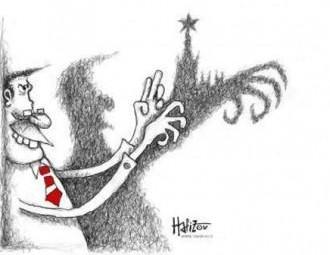Uladzimir Matskevich: Besides "Moscow governing hand" there is also a "Moscow phantom"

Russia's real counteraction to the Eastern Partnership initiative is escalated with the "Moscow phantom", stuck in the heads of many European politicians.
This opinion shared Uladzimir Matskevich, the head of the Board of the International Consortium “EuroBelarus”, commenting upon the statement made by Aliaksandr Milinkevich, the leader of the Movement "For Freedom!" who claimed that the neutralization of the "Eastern Partnership" initiative by Kremlin is going on.
"This initiative has evoked Russia's concern as far back as the time of the Eastern Partnership proclamation, - recalled Uladzimir Matskevich. - And at that time Russia translated its concern to the European politicians; that is why some of them suggested including Russia into the Eastern Partnership program. But it never happened".
With the expression of concern by the EaP initiative, Moscow made it clear for Europe that it was interfering into Russia'ssphere of influence. "It is up to this time that Russian politicians are thinking in the categories of the Cold War era; that is why this division onto the spheres of influence is still alive in their claims".
"But besides Moscow "ruling hand", there is also "Moscow phantom", - continued the head of the Board of the International Consortium "EuroBelarus", - the phantom, still stuck in the heads to the European politicians. That is why European politicians often act having the thought about Kremlin and its reaction in the back of their minds". It is with this thought that the indecisiveness, typical of many European politicians.is explained
Uladzimir Matskevich exemplified his claim with the assumption made by the Germany when the Councilor Gerhard Shredder and Foreign Minister Joschka Fisher held power. At that time German doctrine in relation to Belarus presupposed that democratization, liberalization and economic reforms in Belarus are to be implemented through the official Moscow. "However, later on, when Putin came to power, this doctrine was reviewed. And the Government of Angela Merkel doesn't employ this doctrine anymore. But still, it took long time for the German politics to change its guidelines", - noted the head of the "EuroBelarus".
However, he believes that the EU politics in relation to the countries of the Eastern Europe should undergo certain change.
"It doesn't mean that we should reject the politics used before, as from the strategic point, it is rather correct, - stated the public activist. - On the other hand, Europe seems to underestimate its inner problems, the state of democracy and civil society in our countries".
According to Uladzimir Matskevich, the EU strategy in relation to the EaP countries should be much better coordinated and one-goal-directed; but not to be that chaotic, indistinct and orientated on the politics after the Cold War era: "At that time we thought that the information support and technical aid provided to the Soviet countries can be justified. But for today Europe in the EaP countries practically acts in darkness. No sufficient research is carried out and there is not enough information about the situation in our countries".
-
03.01
-
07.10
-
22.09
-
17.08
-
12.08
-
30.09








































